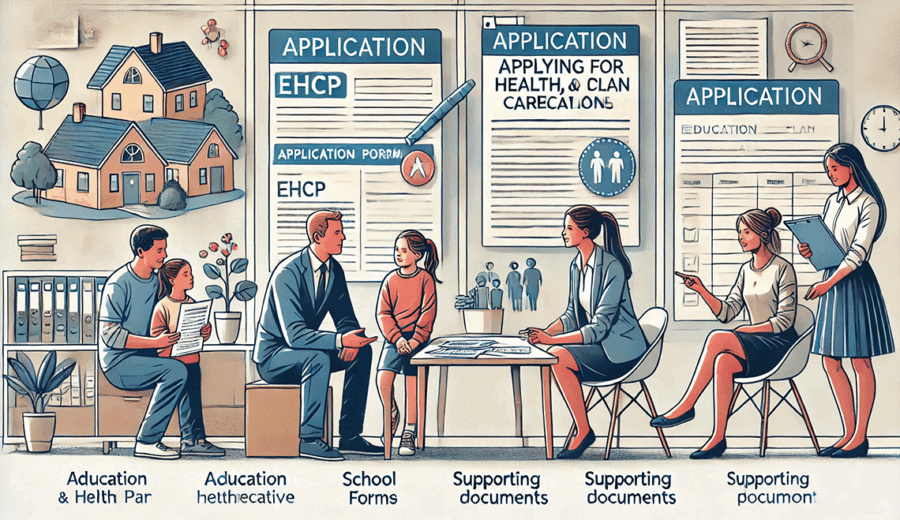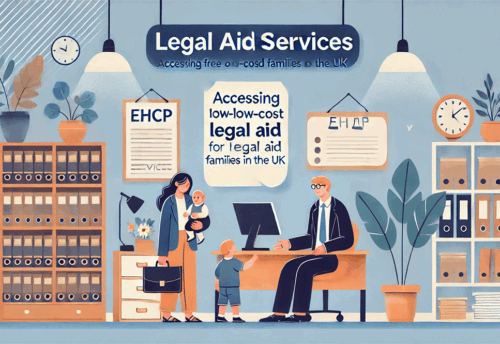
November 27, 2024
Applying for EHCP Funding
Applying for EHCP Funding: Tips for Parents
An Education, Health, and Care Plan (EHCP) is a vital resource for children with special educational needs and disabilities (SEND) in the UK. It provides tailored support to meet a child’s educational, health, and social care needs. Securing EHCP funding can be complex, but with the right preparation, parents can navigate the process effectively. Here’s a detailed guide:
1. Understanding EHCP Funding
1.1 What is an EHCP?
- A legally binding document outlining the child’s specific needs and the support required.
- Covers education, health, and social care services to ensure holistic support.
1.2 Purpose of EHCP Funding
- Provides financial resources to deliver the support outlined in the EHCP.
- Allocates funds for specialist teaching, therapies, equipment, and other services.
2. Steps to Apply for an EHCP
2.1 Step 1: Identify the Need
- Discuss concerns with the school’s Special Educational Needs Coordinator (SENCO).
- Gather evidence that the child’s needs exceed the support available through regular school resources.
2.2 Step 2: Submit a Request for Assessment
- Parents or schools can request an EHCP assessment from the local authority.
- Include detailed reasons and evidence supporting the request.
2.3 Step 3: Assessment Process
- The local authority assesses whether the child qualifies for an EHCP.
- Input is collected from parents, teachers, health professionals, and other specialists.
2.4 Step 4: Drafting the EHCP
- If approved, a draft EHCP is created, outlining the child’s needs, goals, and required support.
- Parents can review and suggest changes before it’s finalized.
2.5 Step 5: Securing Funding
- Once the EHCP is finalized, funding is allocated to the school or service providers to implement the plan.
3. Preparing a Strong EHCP Application
3.1 Gather Evidence
- Reports from professionals such as educational psychologists, therapists, or doctors.
- Examples of how the child’s needs impact learning and daily life.
- School records, including Individual Education Plans (IEPs) and progress reports.
3.2 Write a Parent Statement
- Describe the child’s strengths, challenges, and needs in detail.
- Include specific examples of how their needs affect education, health, and social interactions.
3.3 Highlight Unmet Needs
- Clearly explain why existing support is insufficient.
- Provide examples of failed interventions or ongoing struggles.
4. Working with Professionals
4.1 Engage with SENCO
- SENCOs play a crucial role in identifying needs and coordinating evidence.
- Regularly communicate with them to ensure alignment.
4.2 Consult Health Professionals
- Obtain reports from speech therapists, occupational therapists, or pediatricians to strengthen your case.
4.3 Seek Independent Advice
- Organizations like IPSEA and Contact provide guidance on EHCP applications and appeals.
5. Key Tips for Success
5.1 Be Thorough and Specific
- Detail every aspect of the child’s needs and the exact support required.
- Avoid vague language; use measurable goals and clear descriptions.
5.2 Stay Organized
- Keep copies of all correspondence, reports, and application documents.
- Use checklists to track the application process.
5.3 Prepare for Rejection
- Not all requests are approved initially. Be prepared to request a reconsideration or appeal.
6. Appealing a Rejected EHCP Application
6.1 Request a Reconsideration
- Provide additional evidence or clarification to support your case.
6.2 Mediation
- Engage in mediation with the local authority to resolve disputes without a tribunal.
6.3 SEND Tribunal
- If mediation fails, parents can appeal to the SEND Tribunal for an independent review.
7. Understanding Funding Allocation
7.1 How Funds Are Used
- Supports specialist teaching or additional staffing.
- Covers therapies like speech, occupational, or behavioral therapy.
- Funds necessary equipment or assistive technologies.
7.2 Monitoring and Reviews
- EHCPs are reviewed annually to ensure the funding meets the child’s evolving needs.
8. Resources for Parents
- IPSEA (Independent Parental Special Education Advice): Offers free legal advice on EHCPs.
- SENDIASS (SEND Information, Advice, and Support Service): Provides local support for navigating the EHCP process.
- Contact: Supports families of children with disabilities.
9. Overcoming Challenges
9.1 Delays in Assessment
- Follow up regularly with the local authority to ensure timelines are met.
- Seek advocacy support if delays persist.
9.2 Inadequate EHCP Content
- Suggest specific changes during the draft review.
- Include additional evidence to justify requests.
10. Final Thoughts
Applying for EHCP funding requires persistence, detailed preparation, and collaboration with professionals. By understanding the process and leveraging available resources, parents can secure the necessary support to help their children thrive.





Leave a Reply